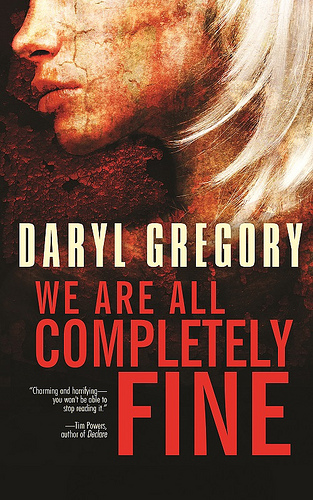We Are All Completely Fine, recently released by Tachyon Publications, is a fresh novella from Daryl Gregory—clocking in at under two-hundred pages, it’s more or less an afternoon’s reading. The conceit of the piece is that the characters are all part of a therapy group for the “last survivor” (read: Final Girl, Final Boy) of supernatural catastrophe or violence; it’s a fairly metafictional mashup between a Lovecraftian universe and the more staid/predictable world of horror film.
I’m generally pleased to see presses—generally independent or small, like Tachyon—tackling the work of publishing stand-alone novellas; it’s an interesting length and form that doesn’t get as much show-room as it could use. So, while I’m perhaps outside of the general audience for much straight-up horror fiction, I thought I’d give this one a look; the story’s self-referential slyness and Gregory’s talented prose were also motivating factors.
However, while at the outset I found this novella to be a good read, one that I was certainly enjoying, by the end I found myself a bit unsatisfied. The premise, which starts strong, doesn’t end up sustaining its tension throughout the length of the narrative; the metafictional components become somewhat of a crutch as opposed to an enjoyable game. I suspect part of the reason for this is that the characters seem to develop up to about the halfway point of the piece and then freeze; Harrison, for example, seems more like a trope than a person by the end.
Which has its uses as a strategy or technique, of course, particularly in a piece driven by its referentiality to other narratives—but works less well when the first half of the story does flesh out these “final survivors” into individuals with lives and needs and desires. In the end, that juxtaposition creates an odd sense of imbalance for me as a reader; it’s as if once the plot began to thicken and the supernatural action got afoot, the interesting character dynamics and development more or less just stopped. The result is a novella that feels a bit like two stories, neither of which runs a full course.
There’s also a sort of sameness to the actual plot and concluding action: it feels as if it’s something I’ve seen a thousand times before, but lacks the incisive commentary or insight that Gregory initially brings to the therapy-group meetings to make the familiar scenes and occurrences seem fresh. The fact that Jan is the child who got away from the Weaver family, that Stan brings a gun to the final battle even though he was told not to and it saves the day, that the weird young woman is a sort of bleak savior, that evil—it turns out—is perpetual and unconquerable and waiting for us always, etc. All of these moments and observations from the concluding quarter or so of the story struck me as bland; they’re pretty familiar and easy to see coming.
And, unlike the early chapters with the dynamic interplay between characters as they attempt to share trauma and hide other scars entirely, it doesn’t have any sort of unique spark to set it off and keep my attention. It’s a perfectly acceptable horror story with appropriate existential dread and nihilistic hopelessness at its close, one that shades over into a sort of paranormal action tale at the close, but I wanted to love it more than I ended up doing. There’s just something missing.
Perhaps it’s that the characters were the source of my intrigue at first—their traumas, their lives—and then those characters took a backseat to a more traditional plot with antagonists and action, which wasn’t quite what I expected or where the story felt as if it would be going. Again: there was a sense of imbalance, for me. What it comes down to is that I was much more interested in Barbara’s personal drive to know what messages the serial killer-slash-monster who abducted her had left in scrimshaw on her bones than I was in the actual “message” about the future (and the hopelessness of combating the supernatural) she uncovers during her suicide.
Similarly, Martin’s need for his frames and digital interface were more compelling when not a literal part of tracking down Greta; Harrison’s seemingly encyclopedic knowledge of the horrors beyond our imagining was also more appreciable before it became part of the “as you know, Bob” explanations for the Hidden One Greta’s cult had been cultivating.
Which is, possibly, a personal problem: I suspect there are tons of readers who will find the shift in narrative and tone totally acceptable and enjoy it for what it is. I’m just not one of them. And really, as I said, I found the first half of We Are All Completely Fine to be a great read—I was engaged and found the construction of victimhood and survival to be interesting, I liked the sort of backbiting commentary on the horror genre tucked into the personal stories, and I’m sometimes a sucker for a good Lovecraftian universe. Unfortunately, I also felt that that initial investment didn’t quite come to fruition; while I didn’t mind reading the rest, and it is certainly readable and entertaining enough, it doesn’t have the same momentum or freshness of the beginning. Perhaps expectations were the killer, here, for my engagement; nonetheless, I found myself wanting more than this novella in the end delivered.
We Are All Completely Fine is available now from Tachyon
Read an excerpt from the novella here on Tor.com
Lee Mandelo is a writer, critic, and editor whose primary fields of interest are speculative fiction and queer literature, especially when the two coincide. She can be found on Twitter or her website.










